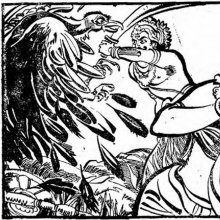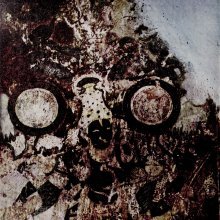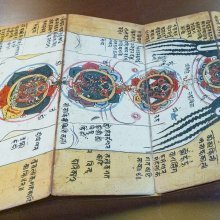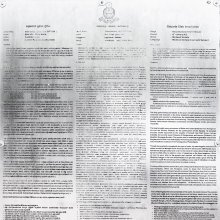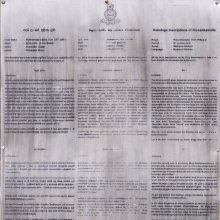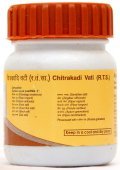Pur, Pūr: 13 definitions
Introduction:
Pur means something in Jainism, Prakrit, Hinduism, Sanskrit, the history of ancient India, Hindi, Tamil. If you want to know the exact meaning, history, etymology or English translation of this term then check out the descriptions on this page. Add your comment or reference to a book if you want to contribute to this summary article.
Images (photo gallery)
In Jainism
General definition (in Jainism)
Source: The University of Sydney: A study of the Twelve ReflectionsPur (पुर्) refers to a “town”, according to the Yogaśāstra vol. 2, p. 859, l. 5.—Accordingly, “Also Nami, knowing the difference between the self and wealth, said to Indra with regard to the burning of the town (pur-dāha), in the burning of the town (purī) of Mithilā nothing burns me”.

Jainism is an Indian religion of Dharma whose doctrine revolves around harmlessness (ahimsa) towards every living being. The two major branches (Digambara and Svetambara) of Jainism stimulate self-control (or, shramana, ‘self-reliance’) and spiritual development through a path of peace for the soul to progess to the ultimate goal.
India history and geography
Source: archive.org: Personal and geographical names in the Gupta inscriptionsPur (पुर्) is mentioned as a synonym for “town” or “city” according to the Amarakośa 2.2.

The history of India traces the identification of countries, villages, towns and other regions of India, as well as mythology, zoology, royal dynasties, rulers, tribes, local festivities and traditions and regional languages. Ancient India enjoyed religious freedom and encourages the path of Dharma, a concept common to Buddhism, Hinduism, and Jainism.
Languages of India and abroad
Sanskrit dictionary
Source: DDSA: The practical Sanskrit-English dictionaryPur (पुर्).—6 P. (purati) To go before, precede.
--- OR ---
Pur (पुर्).—f. (Nom. sing. pūḥ; instr. du. pūrbhyām)
1) A town, fortified town; पूरण्यभिव्यक्तमुखप्रसादा (pūraṇyabhivyaktamukhaprasādā) R.16.23.
2) A fortress, castle, strong-hold.
3) A wall, rampart.
4) The body; पुरश्चक्रे द्विपदः पुरश्चक्रे चतुष्पदः (puraścakre dvipadaḥ puraścakre catuṣpadaḥ) Bṛ. Up.2.5.18.
5) Intellect.
--- OR ---
Pūr (पूर्).—I. 4 Ā (pūryate, pūrṇa)
1) To fill, fill out (allied in this sense with pass. of pṝ q. v.).
2) To please, satisfy. -II. 1 U. (pūrayati-te, pūrita; strictly the Caus. of pṝ q. v.)
1) To fill; को न याति वशं लोके मुखे पिण्डेन पूरितः (ko na yāti vaśaṃ loke mukhe piṇḍena pūritaḥ) Bhartṛhari 2.118; Śiśupālavadha 9.64;16.34.
2) To blow into or fill with wind, blow (as a conchshell).
3) To cover, surround; पूरयन्तः समाजग्मुर्भयदाया दिशो दश (pūrayantaḥ samājagmurbhayadāyā diśo daśa) Bhaṭṭikāvya 7.3.
4) To fulfil, satisfy; पूरयतु कुतूहलं वत्सः (pūrayatu kutūhalaṃ vatsaḥ) Uttararāmacarita 4; so आशाम्, मनो- रथम् (āśām, mano- ratham) &c.
5) To intensify, strengthen (as sound).
6) To make resonant.
7) To load or enrich with (gifts &c.).
8) To draw (as a bow).
9) To spend (time).
Source: Cologne Digital Sanskrit Dictionaries: Shabda-Sagara Sanskrit-English DictionaryPur (पुर्).—f.
(-pūḥ) A city. E. pur to lead, kvip aff.
--- OR ---
Pur (पुर्).—[pura] r. 6th cl. (purati) To precede, to lead, to go before. tu0 para0 saka0 seṭ .
--- OR ---
Pūr (पूर्).—[pūra] r. 4th cl. (ī) pūrī (pūryate) 1. To satisfy. 2. To fill. 3. To be satisfied. 4. To be full. divā0 ātma0 saka0 seṭ . r. 10th cl. (pūrayati-te) 1. To satisfy. 2. To fill out. 3. To fill with wind, to blow. 4. To cover, to surround. 5. To fill with sound, to make resonant. 6. To intensify, to strengthen. cu0 ubha0 saka0 seṭ . With ā 1. To fill, to make full. 2. To blow. 3. To cover, to envelop, to entertwine. With pari To fill completely. With pra, 1. To fill. 2. To enrich, to load with riches. With sama, To fill.
Source: Cologne Digital Sanskrit Dictionaries: Benfey Sanskrit-English DictionaryPur (पुर्).— (probably vb. pṛ10), f. 1. A town, [Bhāgavata-Purāṇa, (ed. Burnouf.)] 6, 6, 12. 2. The body, 2, 10, 28.
--- OR ---
Pur (पुर्).—i. 6, [Parasmaipada.] To go at the head.
--- OR ---
Pūr (पूर्).—see pṛ10.
Source: Cologne Digital Sanskrit Dictionaries: Cappeller Sanskrit-English DictionaryPur (पुर्).—1. [feminine] fullness, abundance (only pūrbhis).
--- OR ---
Pur (पुर्).—2. ([nominative] pūr) [feminine] stronghold, castle, (fortified) town; the body.
Source: Cologne Digital Sanskrit Dictionaries: Monier-Williams Sanskrit-English Dictionary1) Pur (पुर्):—1. pur f. (√pṝ) only [instrumental case] [plural] pūrbhis, in abundance, abundantly, [Ṛg-veda v, 66, 4.]
2) 2. pur [class] 6. [Parasmaipada] purati, to precede, go before, lead, [Dhātupāṭha xxviii, 56] ([probably] invented to furnish an etymology for puras and purā below).
3) 3. pur f. (in [nominative case] sg. and before consonants pūr) a rampart, wall, stronghold, fortress, castle, city, town (also of demons), [Ṛg-veda] etc. etc.
4) the body (considered as the stronghold of the puruṣa q.v.), [Bhāgavata-purāṇa]
5) the intellect (= mahat), [Viṣṇu-purāṇa]
6) Name of a Daśa-rātra, [Kātyāyana-śrauta-sūtra] [Perhaps [from] √pṝ and [originally] identical with 1. pur; cf. [Greek], πόλις]
7) Pūr (पूर्):—[from pur] in [compound] for 3. pur before [consonant]
Source: Cologne Digital Sanskrit Dictionaries: Yates Sanskrit-English Dictionary1) Pur (पुर्):—(śa) purati 6. a. To precede.
2) (pūḥ) 5. f. A city.
3) Pūr (पूर्):—(ya, ī, ṅa) pūryyate 4. d. To satisfy or fill or be full. (ka) pūrayati 10. a. To satisfy.
Source: DDSA: Paia-sadda-mahannavo; a comprehensive Prakrit Hindi dictionary (S)Pūr (पूर्) in the Sanskrit language is related to the Prakrit words: Agghava, Agghāḍa, Pu, Purā.
[Sanskrit to German]
Sanskrit, also spelled संस्कृतम् (saṃskṛtam), is an ancient language of India commonly seen as the grandmother of the Indo-European language family (even English!). Closely allied with Prakrit and Pali, Sanskrit is more exhaustive in both grammar and terms and has the most extensive collection of literature in the world, greatly surpassing its sister-languages Greek and Latin.
Hindi dictionary
Source: DDSA: A practical Hindi-English dictionary1) Pur in Hindi refers in English to:—(nm) a town, city; large leather pot for drawing huge quantity of water out of a well; chamber, room (as [ata:pura]); (a) filled with, full of; ~[jana] townfolk; inhabitants of a city/town; ~[devata] the protecting deity of a town; ~[dvara] main gate of a city/the main entrance to a city/town; ~[nari] a prostitute, harlot; ~[vadhu] see ~[nari; ~vasi]; see ~[jana]..—pur (पुर) is alternatively transliterated as Pura.
2) Pur in Hindi refers in English to:—(nm) stuffing in a sweet delicacy; spate; irrigation by drawing water from a well by a leathern bag; sufficiency, adequacy; —[dalana] to satisfy the requirements/needs; —[padana] to suffice, to be sufficient, to cause to be gratified/satisfied..—pur (पूर) is alternatively transliterated as Pūra.
...
Tamil dictionary
Source: DDSA: University of Madras: Tamil LexiconPūr (பூர்) noun < pūra. Flood; வெள்ளம். பூரம்புராசி [vellam. puramburasi] (மகாபாரதம் இராச. [magaparatham irasa.] 116).
--- OR ---
Pūr (பூர்) [pūrttal] 11 intransitive verb < பூ-. [pu-.] Corr. of பூ-. மீன்பூர்த்துவிட்டது. [pu-. minpurthuvittathu.]
--- OR ---
Pūr (பூர்) [pūr(ru)tal] 4 intransitive verb < புகு-. [pugu-.] To enter. See புகுரு-. [puguru-.]
Tamil is an ancient language of India from the Dravidian family spoken by roughly 250 million people mainly in southern India and Sri Lanka.
See also (Relevant definitions)
Starts with (+3025): Poorak-bajet, Poorviy-samskruti, Puhpati, Punagadubu, Pur vok koong, Pur-poti, Pura, Pura-garnu, Pura-icivucanni, Pura-katupatal, Pura-kirutapavam, Pura-kuttuvelai, Pura-matirceri, Pura-mattainar, Pura-nilaikaruvi, Pura-nilaimarutam, Pura-nilaivalttu, Pura-niracarpu, Pura-pataivitu, Pura-pattuvannam.
Ends with (+106): Akar kupur, Amarpur, Anantapur, Anthpur, Appur, Banapur, Bhaktapur, Bijapur, Bilaspur, Bolanpur, Carolina larkspur, Chandrapur, Cheepur, Chipur, Civappur, Clark valley larkspur, Cockspur, Derdap dapur, Devapur, Dinajpur.
Full-text (+1589): Daridra, Nirdhana, Kripana, Nihsva, Akincana, Durvidha, Dina, Durgata, Dinavatsala, Ranka, Gatartha, Devapur, Purdvar, Nishkimcana, Puhpati, Purdevi, Purbhidya, Duhstha, Purbhid, Purjayana.
Relevant text
Search found 356 books and stories containing Pur, Pūr, Poor; (plurals include: Purs, Pūrs, Poors). You can also click to the full overview containing English textual excerpts. Below are direct links for the most relevant articles:
Bhakti-rasamrta-sindhu (by Śrīla Rūpa Gosvāmī)
Verse 3.4.76 < [Part 4 - Parenthood (vātsalya-rasa)]
Verse 2.3.24 < [Part 3 - Involuntary Ecstatic Expressions (sattvika-bhāva)]
Verse 3.2.55 < [Part 2 - Affection and Service (dāsya-rasa)]
Warfare and Military System in Vedic Literature (by Rinki Deka)
Fortification and Siegecraft < [Chapter 2 - Military System as Revealed in the Vedic Texts]
Rasa Jala Nidhi, vol 3: Metals, Gems and other substances (by Bhudeb Mookerjee)
Part 2 - Purification of silver < [Chapter II - Metals (2): Raupya (silver)]
Shat-cakra-nirupana (the six bodily centres) (by Arthur Avalon)
Verse 36 < [Section 6]
Bharadvaja-srauta-sutra (by C. G. Kashikar)
Rig Veda (translation and commentary) (by H. H. Wilson)
Related products
(+8 more products available)
